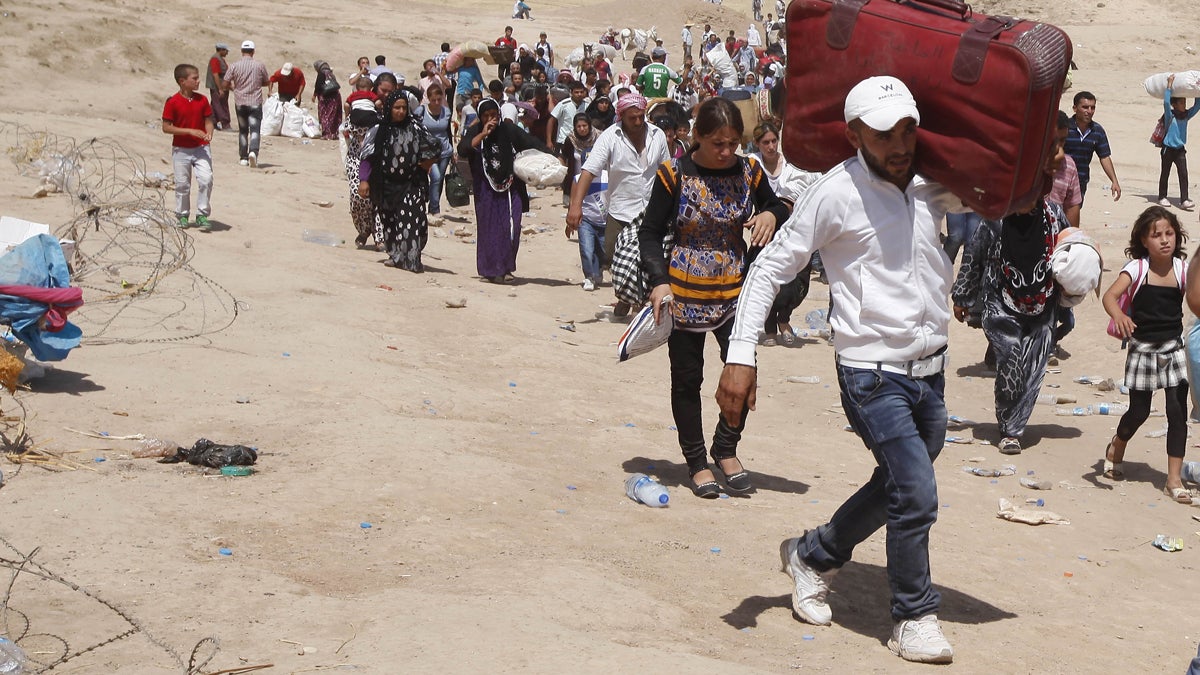U.S. role in Syrian conflict should focus on ending human suffering without combat

Syrian refugees cross into Iraq at the Peshkhabour border point in Dahuk, 260 miles northwest of Baghdad on Tuesday, Aug. 20. (AP Photo/Hadi Mizban)
We must be decisive and clear about our objectives. Reducing suffering without major combat or peacekeeping operations should be a major part of our efforts. Not only is there a moral case, but such actions burnish the regional image of the U.S.
The following is a work of opinion submitted by the author.
When it comes to the Middle East, it really does not matter who is president. No matter who occupies the Oval Office, his party or his intentions, the Middle East seems to have a gravitational pull on our nation’s foreign policy. Ignoring these problems never seems to make them go away. As the focus moves toward Syria, the real question is not if the United States should act but how we should act.
Since the end of the Cold War, the U.S. has sought a grand strategy for foreign policy, specifically, for the Middle East. The internationalists who affirm a global role for the U.S. battle the isolationists. The neo-cons, who believe democracy, reinforced with military intervention if necessary, is an end to itself debate the realists who seek stability. Meanwhile, nation-builders argue with the counter-terrorism crowd. While each theory has its merits, execution always remains the hard part. So what to do with Syria?
Syria started out as a revolt against a dictator, Bashar al-Assad, but has evolved into a proxy fight between Shia and Sunnis with the potential for the violence to spread. Very few heroes exist in this conflict, with Sunni forces utilizing Al Qaeda fighters, and Hezbollah fighting for the Shia. Geopolitics also plays a role with Turkey, Saudi Arabia, Iran and Russia, lending support to various factions.
Stop violence, end suffering
In determining a role for the U.S., we must be decisive and clear about our objectives. The objectives should be attainable and minimize risk. They include: preventing the violence from spreading outside of Syria, reaching a political settlement, and minimizing human suffering.
The spread of violence outside of Syria can be checked by working with surrounding countries to ensure borders are being monitored. Our involvement could include intelligence sharing, airpower and technical assistance. Because most of the bordering nations are allies, relationships already exist to serve as a foundation for action.
Ending the actual violence within Syria, though, can only come through a political settlement. Diplomacy is key, and we must be prepared to work with both Sunni and Shia as well as the regional powers with an interest in Syria. Such an effort must include Iran, a key backer of the Assad regime. Outreach with Iran is not without precedent since the U.S. had held direct talks with Iran in 2007 during the Bush administration. Diplomacy over Syria will be a continuing process in order to maintain any settlement.
Finally, reducing suffering without major combat or peacekeeping operations should be a major part of our efforts. Not only is there a moral case to made for reducing suffering but such actions burnish the image of the U.S. in an area of the world that takes a dim view of us. Specifically, we should be prepared to assist with refugee operations.
Humanitarian leadership
Currently, there are 1.7 million Syrian refugees in host countries. One million of which are children, some of whom are born in these camps without birth certificates and are considered stateless. Host countries and the non-governmental organizations are working to mitigate the suffering. U.S. leadership and assistance is vital to stem this crisis within a crisis.
Such efforts, labeled “humble humanitarianism” by Professor Benjamin Valentino of Dartmouth College, have a proven track record. Actions by the Bush administration to stem the AIDS crisis in Africa proved both successful and popular. Refugee operations around Syria could have the same results with the additional benefit of creating goodwill among the upcoming generation of Syrians who will be tasked with re-building the country and leading it past this conflict.
Ultimately, the U.S. must continue to engage in Middle Eastern affairs. The problems there tend to become problems here when left unattended. However, the key to successful engagement is commitment coupled with realistic objectives and supported by a sound strategy.
—
Joseph Ingemi is a former U.S. Army officer with a strong interest in history and global affairs.
WHYY is your source for fact-based, in-depth journalism and information. As a nonprofit organization, we rely on financial support from readers like you. Please give today.

